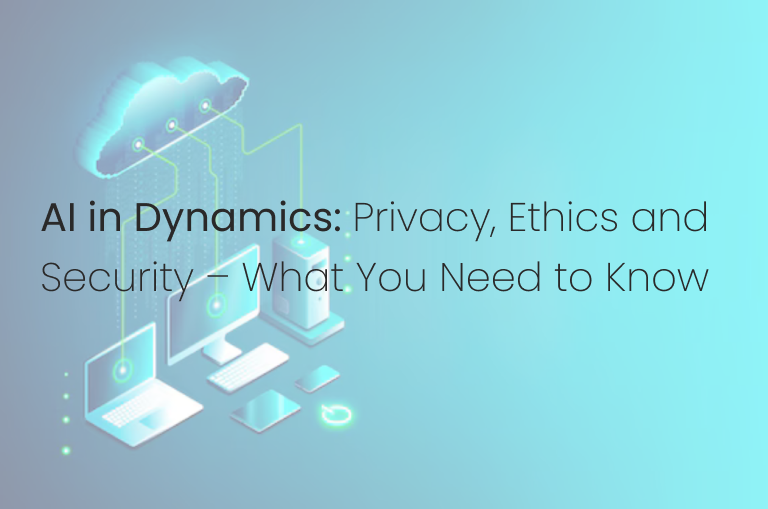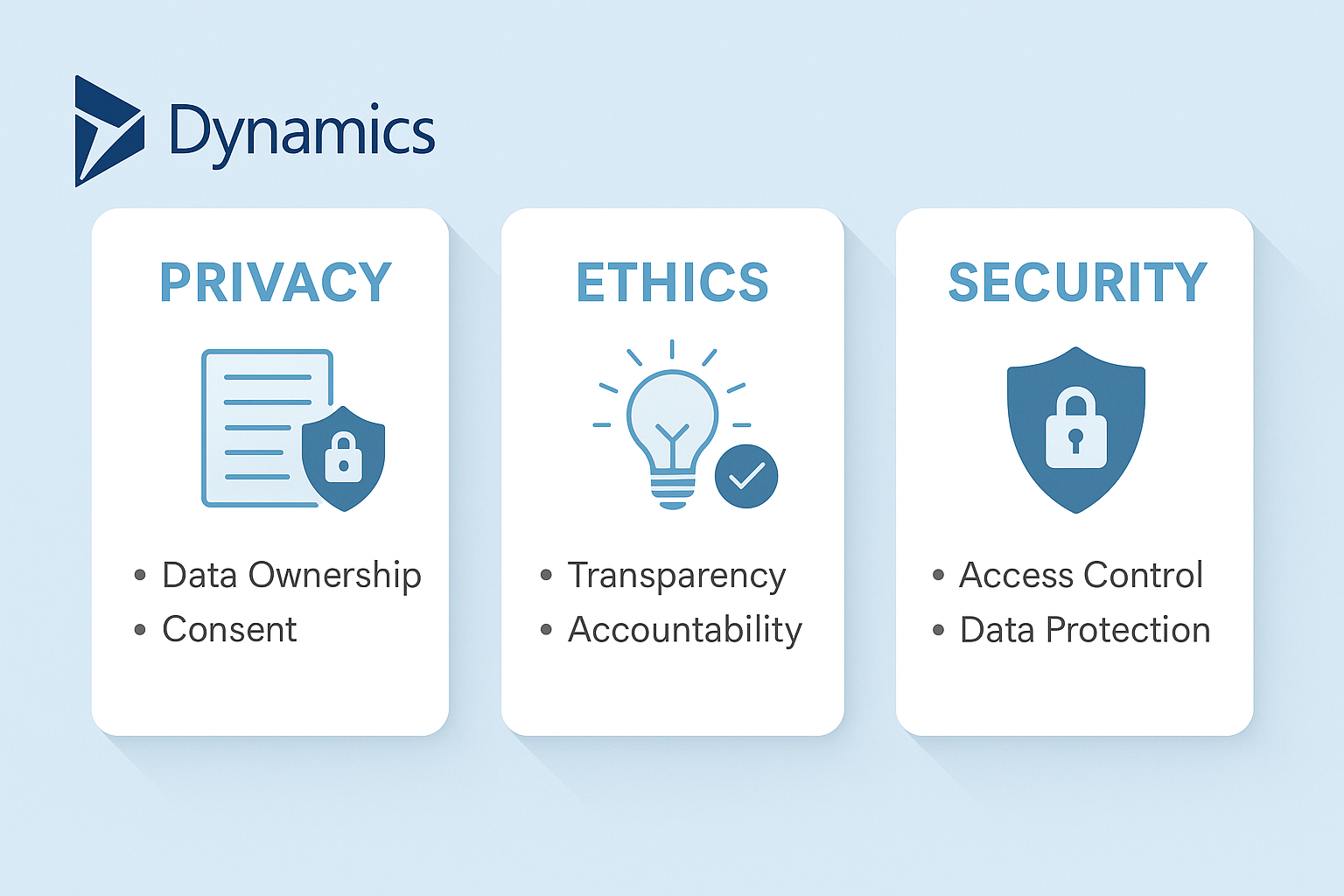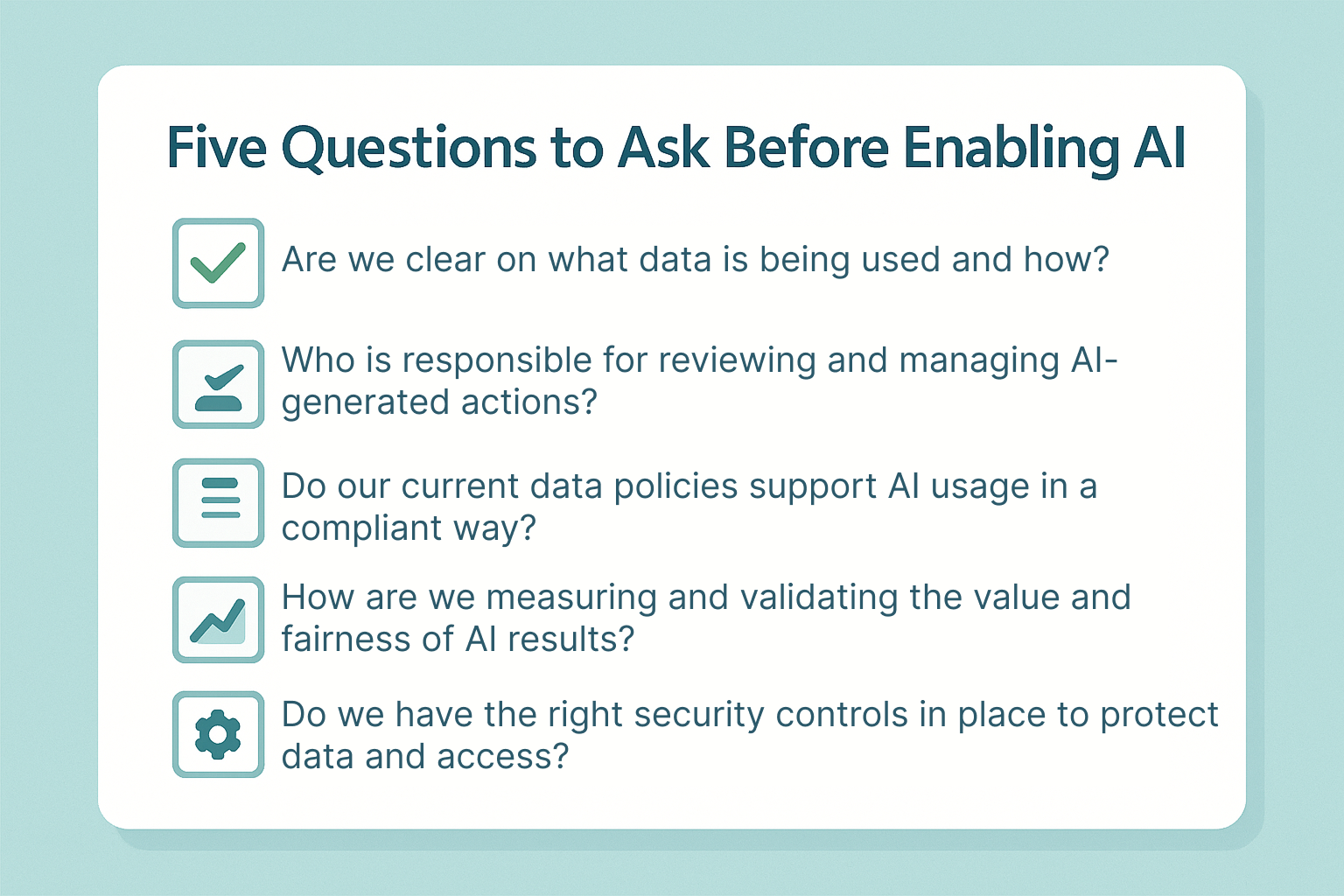AI in Dynamics: Privacy, Ethics and Security – What You Need to Know

Artificial Intelligence is quickly becoming the engine behind modern CRM and ERP systems. Within Microsoft Dynamics 365, AI enhances forecasting, automates workflows, delivers customer insights and recommends actions in real time. But as organisations adopt more AI-powered tools such as Copilot and autonomous agents, questions around privacy, ethics and security become increasingly important.
For business leaders, IT teams and decision-makers, adopting AI in Dynamics is not just about features or automation. It is about using them responsibly. This article explores the three critical pillars of responsible AI in Dynamics 365: protecting privacy, upholding ethical principles and ensuring strong data security.

Privacy: Who Controls the Data and How Is It Handled
When AI processes customer, employee or supplier data, transparency is essential. In Dynamics 365, many features rely on large volumes of structured and unstructured data. This can include email content, sales conversations or service notes. It raises a key question. Is this data being used with the appropriate level of consent and control?
What Microsoft Delivers
Microsoft makes it clear. You own your data. Copilot and other AI features in Dynamics 365 do not use your business data to train Microsoft's public AI models. All data processing takes place in your secured environment and stays within your tenant.
Microsoft’s approach follows responsible AI practices and complies with data privacy regulations such as the General Data Protection Regulation, the UK Data Protection Act and the California Consumer Privacy Act.
What Your Organisation Should Do
Even with Microsoft’s privacy-by-design approach, your team still plays a role. Here are some best practices:
-
Update your privacy and consent policies to cover the use of AI in customer and employee interactions
-
Limit data used by AI tools to only what is necessary and appropriate for the task
-
Conduct regular reviews of access logs and system usage to monitor for any misuse or oversharing of information
By managing privacy proactively, you build customer trust and reduce your legal exposure while enabling secure innovation.
Ethics: Keeping AI Fair, Transparent and Human-Focused
AI is now taking on tasks that previously required human judgment. Whether it is prioritising leads, recommending responses or assigning support cases, AI decisions need oversight. Without clear ethical guidelines, there is a risk of bias, lack of accountability or decisions that do not reflect your values.
How Microsoft Embeds Ethics
Microsoft applies six responsible AI principles in its products: fairness, reliability, inclusiveness, transparency, privacy and accountability. These principles are part of the development and deployment process, not just marketing claims.
In Dynamics, this means AI models are tested for fairness. It also means you are informed when you are interacting with AI-generated suggestions or summaries.
What You Can Do Internally
Organisations should take steps to embed ethical AI at a policy level. For example:
-
Create an internal AI governance framework to review how AI tools are used in Dynamics
-
Assign accountability for AI outcomes to specific team members or roles
-
Ensure humans remain in control of high-impact decisions, even when AI provides guidance
This ethical approach encourages collaboration between people and technology. It helps align AI outputs with your organisation’s values and customer expectations.
Security: Protecting Data in an AI-Driven Environment
AI systems work with sensitive data. That means your security posture must be strong enough to protect not only information but also decision-making tools that act on that information.
Microsoft Dynamics 365 runs on Azure’s enterprise-grade infrastructure. That includes security services that protect both AI features and the core platform.
Microsoft's Security Model for AI in Dynamics
Some key security capabilities that support responsible AI use include:
-
Role-based access control to limit who can access AI features and insights
-
Multi-factor authentication to protect user accounts
-
End-to-end encryption for data in motion and at rest
-
Tenant isolation so your data is not shared with or visible to other users outside your organisation
AI tools in Copilot and other modules are designed to operate securely by default. But your organisation should add its own layers of protection as well.
Security Best Practices for Businesses
To make sure your use of AI in Dynamics remains secure:
-
Review access permissions for AI features and limit them to trusted users
-
Run security audits regularly to check for unexpected data access or workflow changes
-
Avoid exposing AI-driven data or recommendations to external tools unless fully secured and authorised
These steps help prevent data leakage, compliance issues and security incidents that could disrupt your operations or damage trust.
Five Questions to Ask Before Enabling AI in Dynamics
Whether you are using Copilot in Sales, intelligent routing in Customer Service or forecasting in Finance, consider these questions before you begin:
-
Are we clear on what data is being used and how
-
Do our current data policies support AI usage in a compliant way
-
Who is responsible for reviewing and managing AI-generated actions
-
Do we have the right security controls in place to protect data and access
-
How are we measuring and validating the value and fairness of AI results

These questions are not about slowing things down. They are about making smarter, more sustainable choices that lead to better outcomes.
AI Should Work With You, Not Replace You
The real power of AI in Dynamics 365 lies in its ability to assist, not replace. When used responsibly, AI helps teams become more productive, make informed decisions and respond faster to customer needs.
A salesperson can follow up with leads more quickly. A support agent can see a summarised case history without reading every note. A finance officer can reconcile accounts with fewer manual steps. These are practical changes that add real value every day.
AI becomes most effective when your people are trained, your data is clean and your organisation trusts the system.
Final Thought: Trust Is the Foundation
Building responsible AI in Dynamics is not a one-time project. It is an ongoing process that involves your data practices, your culture and your leadership. When you treat privacy, ethics and security as essentials rather than extras, you create the right conditions for AI to thrive.
At ARP Ideas, we help clients implement AI features in Dynamics 365 with security, transparency and business impact in mind. From setting policies to designing responsible workflows, we make sure your organisation is ready to use AI confidently and effectively.
If you would like help assessing your Dynamics environment, planning AI adoption or improving governance, we are here to support you.
